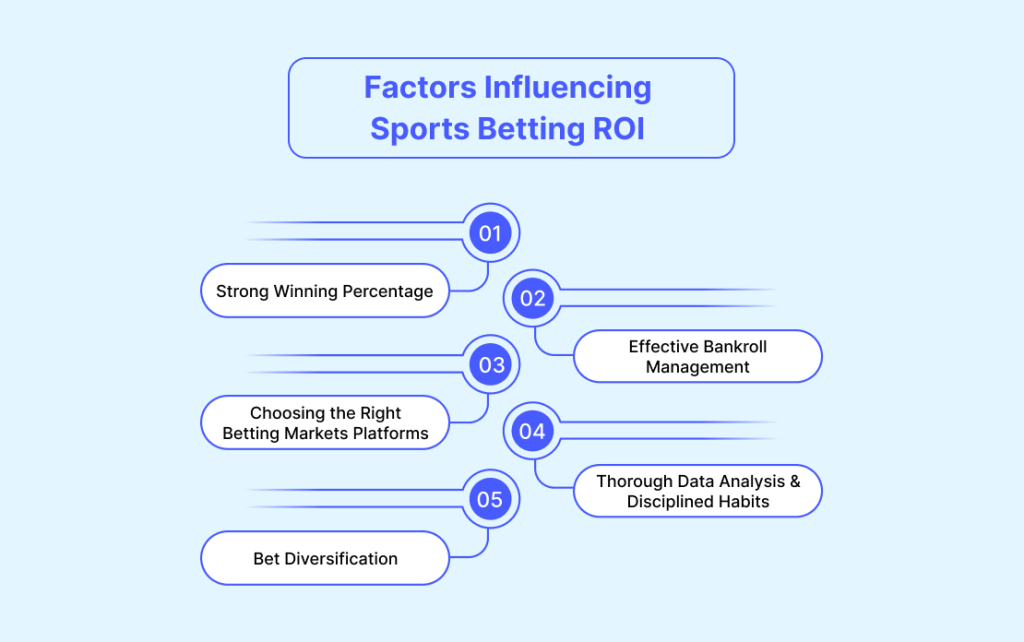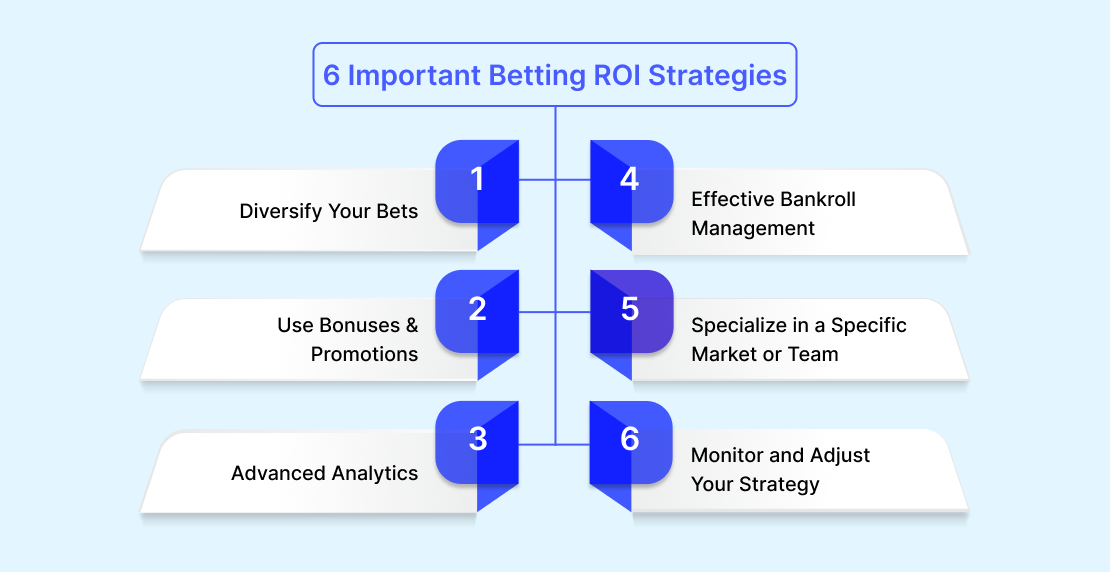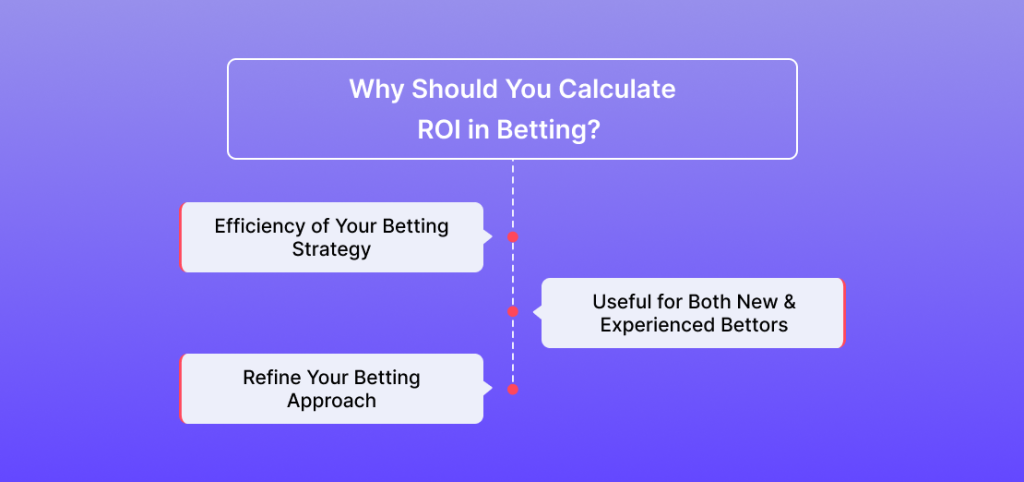
Share it
TABLE OF CONTENTS
- What is ROI in Sports Betting?
- How to Calculate Sports Betting ROI?
- Betting ROI vs Betting Yield: What’s the Difference?
- What is a Good ROI in Sports Betting?
- Factors Influencing Sports Betting ROI
- 6 Important Betting ROI Strategies
- Why Should You Calculate ROI in Betting?
- Maximize Your Sports Betting ROI with GammaStack
- FAQs on ROI Betting

How to Calculate Sports Betting ROI for Your Bets
Let’s break down how to calculate it, step by step. But first, let’s brush up some basics.
What is ROI in Sports Betting?
How to Calculate Sports Betting ROI?
Elements
Best For
Formula to Calculate Relative Sports Betting ROI
ROI = (Net Profit/Total Stake) x 100
Let’s take an example to understand it better.
Say, you’ve bet $100 on a team with +150 moneyline odds.
The profit is = ($100 × 1.5) = $150
So, your relative value in terms of ROI will be:
= (150 / 100) x 100
= 150%
Formula to Calculate Sports Betting ROI
The betting strategy ROI in this case is:
(Units Wagered x Unit Stake Amount) / (No.of Games x Unit Stake Amount)
= 8 x $50 / 10 x $50
= 400/500
= 0.8
= 80%
Betting ROI vs Betting Yield: What’s the Difference?
Here are the basic differences between both.
Parameters
Sports betting ROI
Sports betting Yield
What is a Good ROI in Sports Betting?
If you start with $216 and make a 5% profit each week, it might seem like a small $10 profit at first. But because you have more money, after two weeks you’ll have about $238. After three weeks, you’ll have around $250. In a year, your starting $216 could grow to over $2700. Even though a 5% profit doesn’t look like much, it can become a lot of money over time.
Even though a 5% profit might look small, it can grow a lot over time because of how money can build on itself. To get a good, steady profit, you need to really know the sports you’re betting on, manage your money wisely, and have a smart betting plan.
EXPLORE MORE BLOGS FROM VARIOUS CATEGORIES
Lottery
Casino
Fantasy Sports
Sweepstakes
Factors Influencing Sports Betting ROI


Strong Winning Percentage
A key factor in achieving a positive return on investment (ROI) in sports betting is maintaining a strong winning percentage. While professional bettors often target success rates around 55%, even incremental increases in bet accuracy can lead to substantial gains in overall profitability over time.

Effective Bankroll Management
To manage sports betting risks and rewards, bettors should establish a fixed bankroll and adhere to betting limits. It is advisable to wager only 1-3% of the total bankroll per bet to mitigate the risk of substantial losses while maintaining a balance between potential gains and risks.

Choosing the Right Betting Markets Platforms
Both betting markets and right betting platforms play a crucial role in influencing how big your ROI would be. Pro bettors favor no-vig and peer-to-peer betting for better odds and to minimize bookmaker margins.

Thorough Data Analysis & Disciplined Habits
Looking at numbers and staying focused helps you make smart bets. When you use facts and don't get distracted, you avoid silly mistakes and make better choices about your bets.

Bet Diversification
Betting on different things like who wins, how many points, or if the total is over or under can lower risk and maybe make more money. Each type of bet has different good things about it and changes how much money you could make.
6 Important Betting ROI Strategies


Diversify Your Bets
Betting on different sports or types of bets can lower your risk and help you earn more. Less common betting areas can be better because bookmakers may not know as much about them.

Use Bonuses and Promotions
Sports betting companies give bonuses to get people to bet. Using these deals can increase your betting money without more risk. This can make your overall profit better.

Advanced Analytics
To make better betting choices and boost your return on investment (ROI), consider using detailed statistics like player efficiency and team performance data.

Effective Bankroll Management
To maximize your sports betting ROI, it's crucial to establish and maintain a strict budget. Resist the urge to bet excessively or attempt to recover losses, as these actions can rapidly diminish your funds and negatively impact your overall return.

Specialize in a Specific Market or Team
Developing a deep understanding of a specific sports betting market or team enables refinement of your betting strategy. For instance, by closely following a particular tennis player, you can gain insights into their performance against various opponents, leading to a more consistent betting approach.

Monitor and Adjust Your Strategy
Tracking and comparing your Return on Investment (ROI) and Yield is crucial for pinpointing effective and ineffective betting strategies. By analyzing these metrics, you can refine your approach to focus on more profitable opportunities, leading to consistent earnings.
Looking For An Efficient Sports Betting Software
Offering The Best ROI?
Why Should You Calculate ROI in Betting?

Here are some reasons why you should calculate your ROI betting even when you’re winning more and losing less.

Efficiency of Your Betting Strategy
Figuring out your Return on Investment (ROI) is key to handling your betting money well. ROI analysis shows you how profitable your betting strategies are, helping you see if what you're doing is working. By keeping an eye on your ROI, you can make smart changes to your strategy, boost your profits, and cut your losses to get the most out of your betting funds.

Useful for Both New & Experienced Bettors
Return on Investment (ROI) is a valuable metric for all levels of sports bettors to assess their long-term betting success. This metric clearly indicates the growth of your betting funds and helps evaluate the sustainability and profitability of your betting strategy.

Refine Your Betting Approach
Figuring out ROI is key for long-term success in sports betting. If you understand your ROI, you can bet smarter, see what bets make the most money, and know what needs to change.
Maximize Your Sports Betting ROI with GammaStack
Maximize your sports betting ROI with GammaStack’s reliable and customizable platform. With over 14 years in the industry, GammaStack has launched more than 80 sportsbooks across 45 countries, supported by a team of 500+ professionals. Our software supports live betting, real-time odds, and seamless mobile access, ensuring a smooth experience for users. GammaStack’s zero revenue share policy means you keep 100% of your profits, and you gain full ownership of your custom platform. Having partnerships with top data providers, you get accurate and timely sports data. Choose GammaStack to build a strong, scalable, and profitable sports betting business.
FAQs on ROI Betting
Return on Investment (ROI) is a widely used profitability metric that assesses the performance of an investment. Shown as a percentage value, ROI is calculated by dividing the net profit (or loss) of an investment by its original cost.
In sports betting, ROI benchmarks differ. Professional bettors often target 5-10%, whereas casual bettors may be satisfied with any positive return. Consistent high ROI necessitates in-depth knowledge of the sports being wagered on, prudent bankroll management, and a sound betting strategy.
ROI means how much money you make back on what you spend. To find it, you divide the net profit by the cost. Businesses use ROI to see if their investments are making money.
Return on Investment (ROI) in sports betting is a percentage that indicates the profitability of bets over a specific timeframe. In contrast, yield definitively demonstrates the effectiveness of a betting strategy, which bettors commonly employ in various forms.
Sports betting odds change based on public expectations and sportsbook analysis. Picking underdogs correctly often yields better returns than favorites. Consistently betting on favorites or low-risk investments requires more frequent wagers to achieve the same return as riskier options with longer odds. Higher potential payouts come with increased risk, while underdogs offer more value if they outperform market expectations.

